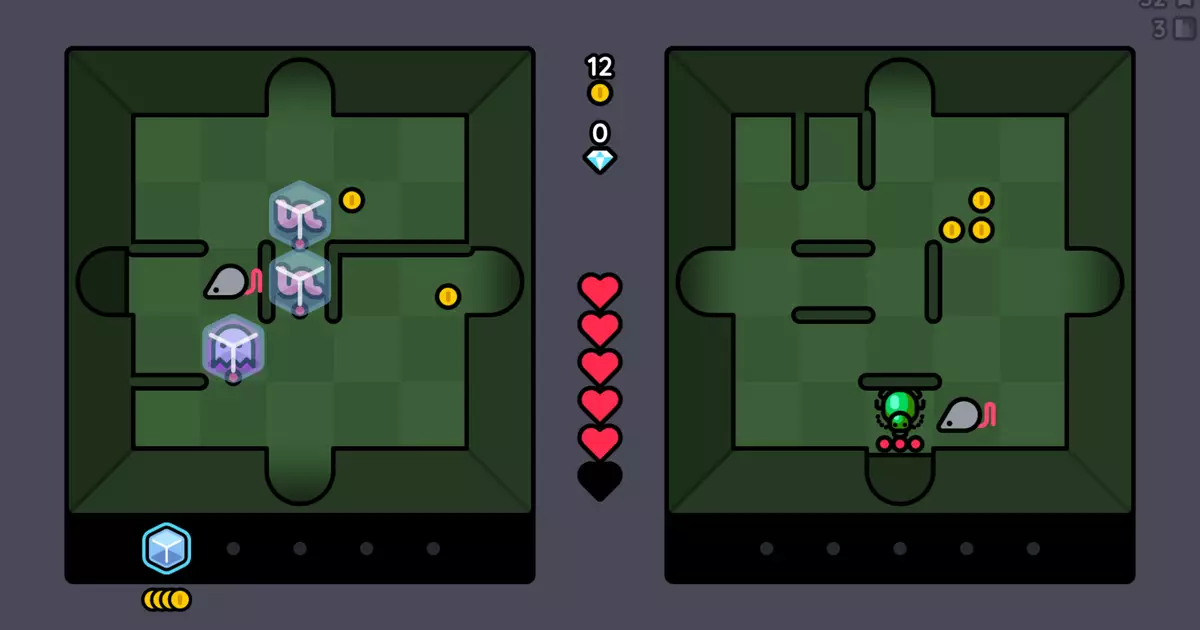In the ever-evolving landscape of video games, innovation often struggles to break through the noise of sequels and remakes. However, *Rat King* emerges as a striking anomaly—a game that challenges conventions and reshapes how we perceive puzzle design. Faced with an overwhelming surge of mediocrity, this title boldly stands out by blending split-screen mechanics, resource management, and intricate timing to craft an experience that is both fresh and deeply engaging.
What makes *Rat King* genuinely compelling isn’t just its premise but its fearless execution of complex coordination. It forces players to think multi-dimensionally, managing two characters in separate yet interconnected environments. Unlike traditional puzzle games that focus on single-character logic, this game demands simultaneous consciousness—balancing risk and reward across parallel corridors, each with its own set of threats and opportunities. This duality generates an addictive tension, empowering the player with a sense of mastery in chaos.
Gameplay Mechanics and Layered Complexity
At the core, *Rat King* revolves around controlling two rats navigating different 5×5 rooms riddled with enemies, traps, and treasures. The shared health bar adds an element of peril—leave one rat vulnerable, and the whole endeavor risks collapse. The challenge is not merely about avoiding enemies but orchestrating a sequence of moves that keep both rodents alive, collecting coins, dodging specters, and progressing deeper. It’s a game where patience, precision, and foresight are essential.
A noteworthy feature is the game’s manipulation of spatial awareness. Players can shift one rat independently, effectively “reshuffling” the situation, which adds layers of complexity. For example, positioning one rat against a wall to block progress while maneuvering the other to gather loot or bypass enemies, shows how strategic depth is baked into the core loop. This juggling act is reminiscent of a mental chess game—anticipating enemy spawn patterns, timing moves, and deciding when to sacrifice one rat for the greater good.
The game’s environment also introduces risk through ghostly repercussions—bouncing off walls repeatedly awakens vengeful spirits, punishing reckless gameplay. This design choice subtly encourages planning over brute-force tactics, aligning perfectly with the game’s layered challenge. It elevates the experience, discouraging mindless button mashing in favor of elegant, deliberate problem-solving.
The Power of Items and Player Agency
What sets *Rat King* apart further is its tactical depth offered through collectible items. These aren’t mere power-ups but strategic tools that shape how players approach each level. For example, the ice cube freezes enemies temporarily, allowing safe passage, while the purple swirl distorts control inputs, presenting an intriguing twist on standard mechanics. Using these tools effectively requires understanding your environment and adapting on the fly, turning each run into a delicate balance of resource management and tactical execution.
These items—though limited—encourage experimentation, inviting players to develop personalized strategies. The game subtly rewards mastery of its mechanics, similar to lockpicking mini-games or hacking puzzles, demanding patience, pattern recognition, and precise timing. The reference to classic games like *868-Hack* underscores how *Rat King* elevates the genre by integrating minimalistic yet deep mechanics, making every movement feel crucial and rewarding.
The Allure of the Unfinished and the Promise of Mastery
While my exploration of *Rat King* is just beginning, its potential as a timeless classic is already palpable. Its design philosophy champions complexity wrapped in simplicity—a hallmark of great puzzle games. The game’s constraints push players to develop elegant solutions rather than brute-force their way through obstacles. The way it balances risk and reward, patience and impulsiveness, makes each session a mental workout that rewards perseverance.
In a market saturated with superficial experiences, *Rat King* exudes authenticity—a testament to what indie developers can achieve when unshackled by commercial expectations. Its blend of strategic planning, spatial awareness, and risk management sees it poised to inspire a new wave of puzzle titles that prioritize depth over spectacle. For anyone craving a game that tests the mind, provokes curiosity, and rewards ingenuity, *Rat King* offers a compelling invitation to master the art of simultaneous problem-solving.
—
Note: This article is an original interpretation based on the provided material, offering a critical perspective and fresh insight into *Rat King*’s innovative gameplay and potential within the puzzle genre.

